Organisational Behaviour Report: Next Plc and Key Concepts
VerifiedAdded on 2021/02/21
|13
|4003
|142
Report
AI Summary
This report provides an in-depth analysis of organisational behaviour, focusing on how culture, power, and politics influence individual and team behavior and performance within an organisation. It uses Next Plc as a case study. The report examines Handy's theory of culture, different types of power, and the impact of organisational politics. Furthermore, it evaluates content and process theories of motivation, including Maslow's hierarchy of needs, Herzberg's motivation theory, expectancy theory, and Adam's equity theory, to determine how these theories and motivational techniques enable effective achievement of goals. The report also differentiates between effective and ineffective teams and applies concepts and philosophies of organisational behaviour within an organisational context, concluding with a summary of the key findings and their implications for organisational success.
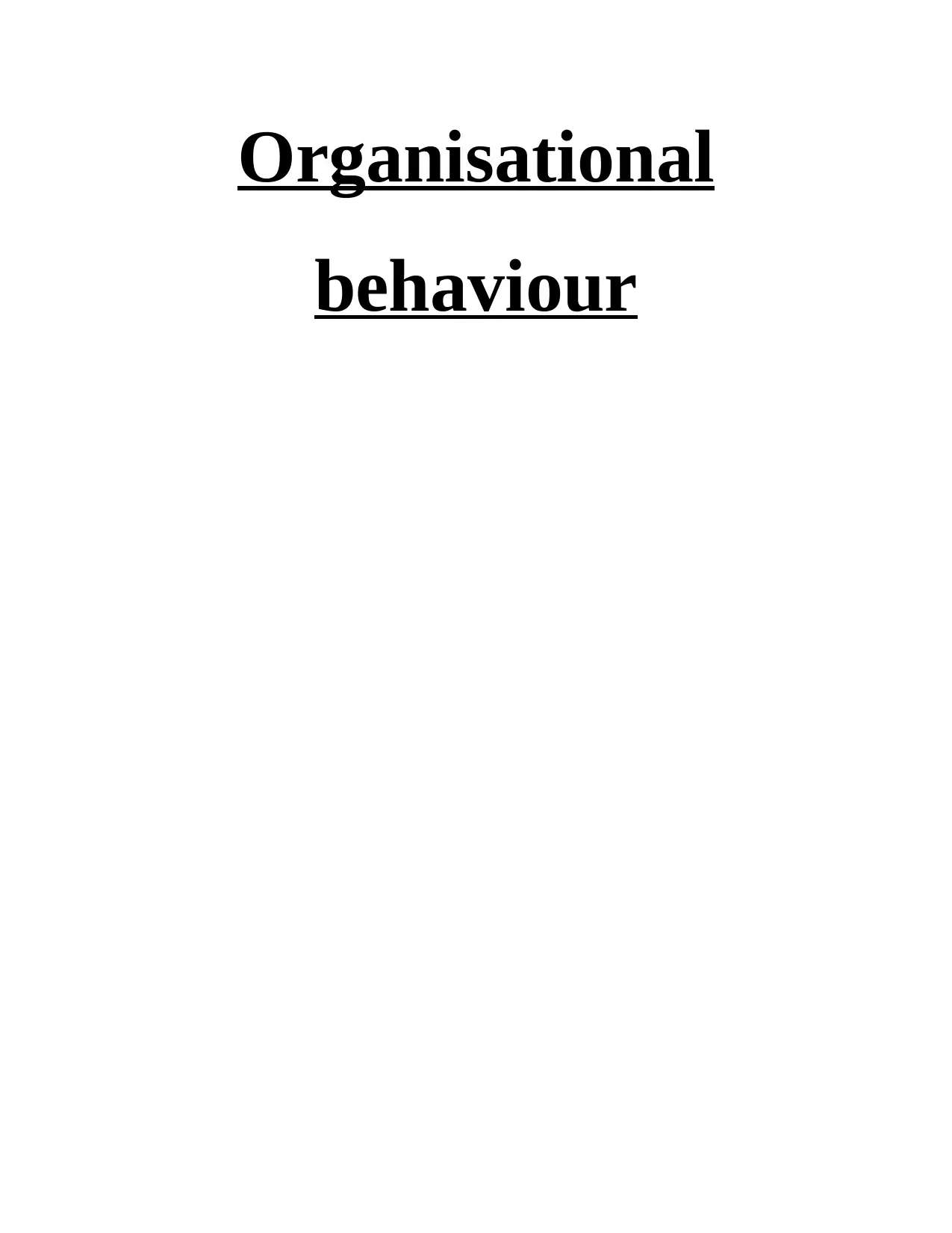
Organisational
behaviour
behaviour
Paraphrase This Document
Need a fresh take? Get an instant paraphrase of this document with our AI Paraphraser
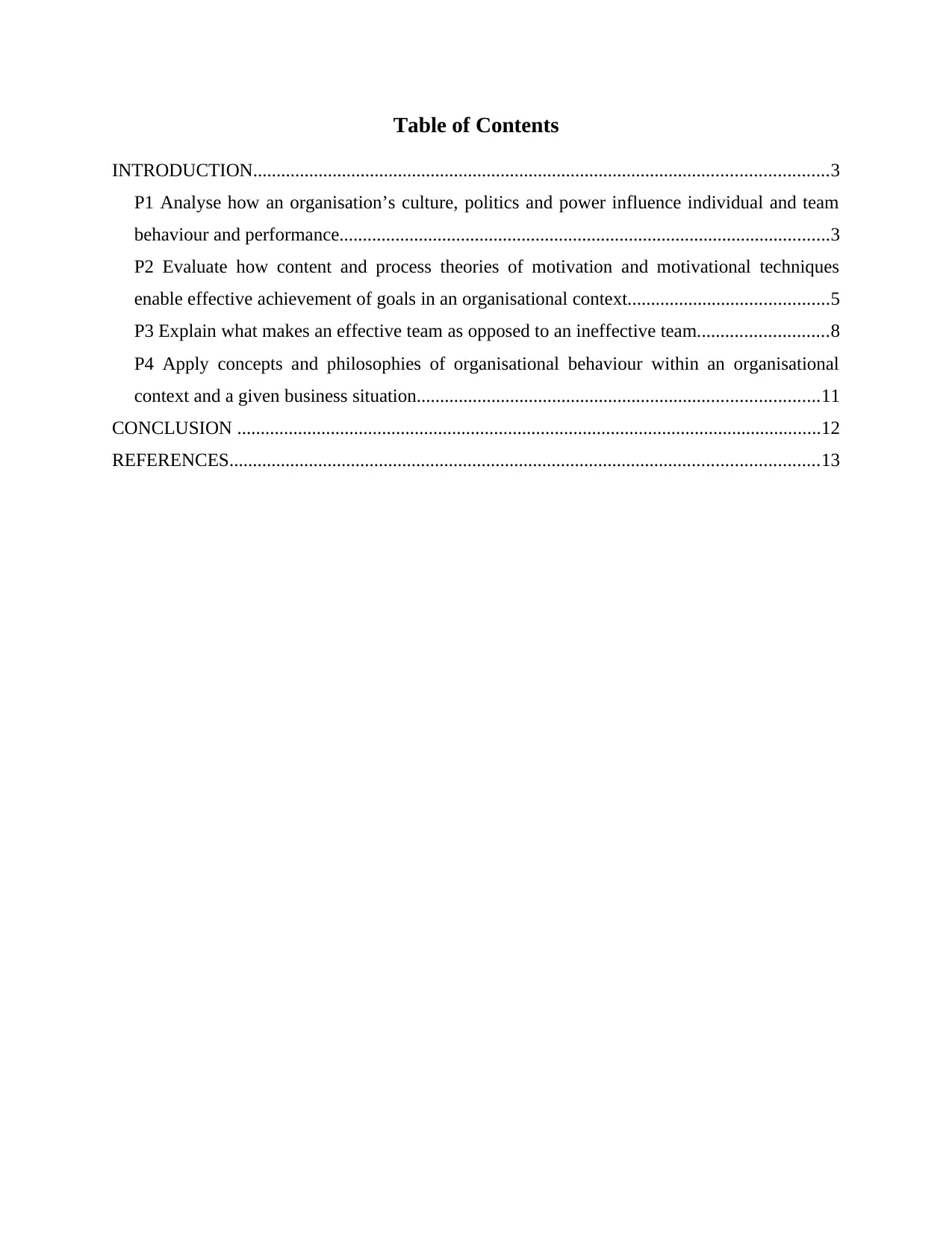
Table of Contents
INTRODUCTION...........................................................................................................................3
P1 Analyse how an organisation’s culture, politics and power influence individual and team
behaviour and performance.........................................................................................................3
P2 Evaluate how content and process theories of motivation and motivational techniques
enable effective achievement of goals in an organisational context...........................................5
P3 Explain what makes an effective team as opposed to an ineffective team............................8
P4 Apply concepts and philosophies of organisational behaviour within an organisational
context and a given business situation......................................................................................11
CONCLUSION .............................................................................................................................12
REFERENCES..............................................................................................................................13
INTRODUCTION...........................................................................................................................3
P1 Analyse how an organisation’s culture, politics and power influence individual and team
behaviour and performance.........................................................................................................3
P2 Evaluate how content and process theories of motivation and motivational techniques
enable effective achievement of goals in an organisational context...........................................5
P3 Explain what makes an effective team as opposed to an ineffective team............................8
P4 Apply concepts and philosophies of organisational behaviour within an organisational
context and a given business situation......................................................................................11
CONCLUSION .............................................................................................................................12
REFERENCES..............................................................................................................................13
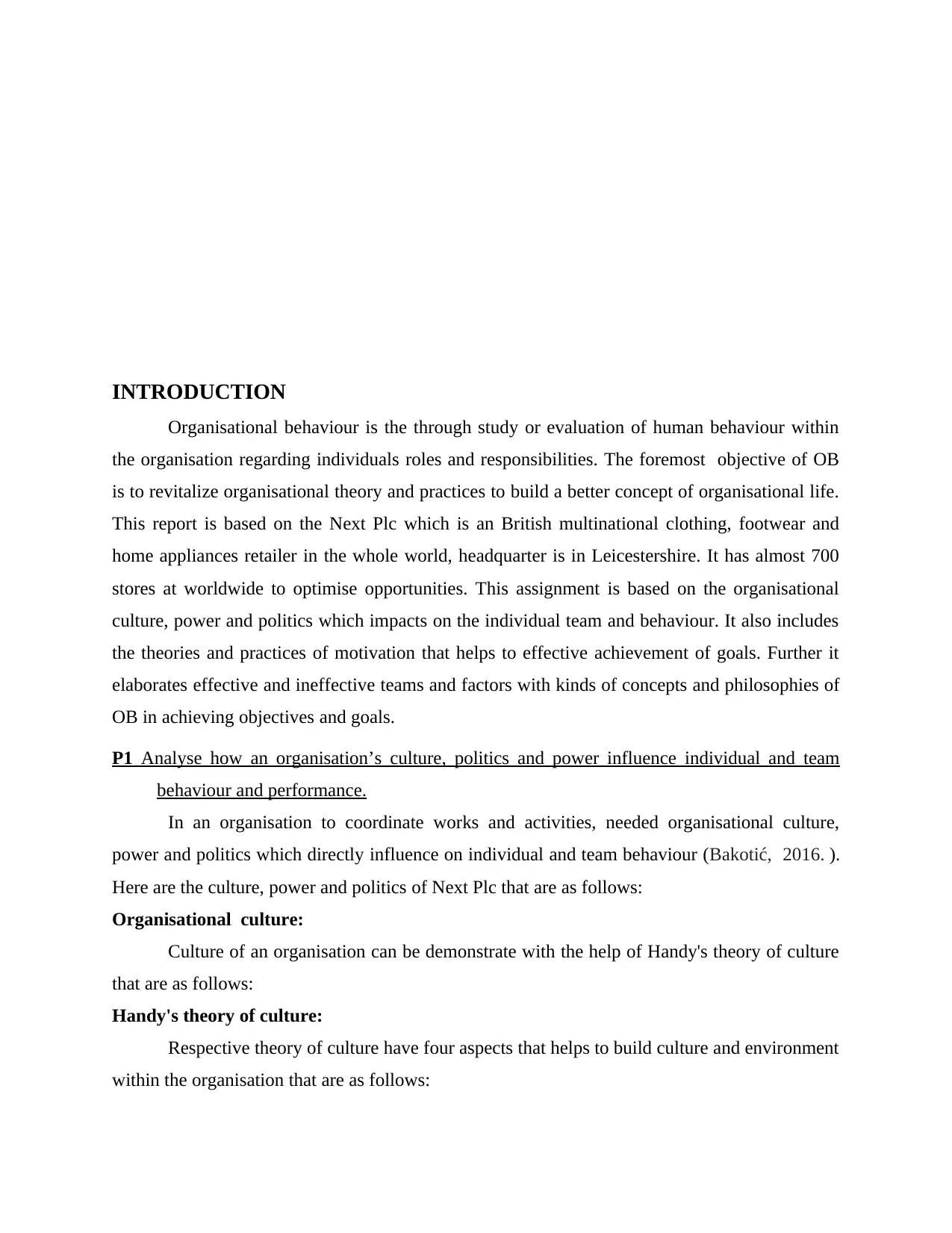
INTRODUCTION
Organisational behaviour is the through study or evaluation of human behaviour within
the organisation regarding individuals roles and responsibilities. The foremost objective of OB
is to revitalize organisational theory and practices to build a better concept of organisational life.
This report is based on the Next Plc which is an British multinational clothing, footwear and
home appliances retailer in the whole world, headquarter is in Leicestershire. It has almost 700
stores at worldwide to optimise opportunities. This assignment is based on the organisational
culture, power and politics which impacts on the individual team and behaviour. It also includes
the theories and practices of motivation that helps to effective achievement of goals. Further it
elaborates effective and ineffective teams and factors with kinds of concepts and philosophies of
OB in achieving objectives and goals.
P1 Analyse how an organisation’s culture, politics and power influence individual and team
behaviour and performance.
In an organisation to coordinate works and activities, needed organisational culture,
power and politics which directly influence on individual and team behaviour (Bakotić, 2016. ).
Here are the culture, power and politics of Next Plc that are as follows:
Organisational culture:
Culture of an organisation can be demonstrate with the help of Handy's theory of culture
that are as follows:
Handy's theory of culture:
Respective theory of culture have four aspects that helps to build culture and environment
within the organisation that are as follows:
Organisational behaviour is the through study or evaluation of human behaviour within
the organisation regarding individuals roles and responsibilities. The foremost objective of OB
is to revitalize organisational theory and practices to build a better concept of organisational life.
This report is based on the Next Plc which is an British multinational clothing, footwear and
home appliances retailer in the whole world, headquarter is in Leicestershire. It has almost 700
stores at worldwide to optimise opportunities. This assignment is based on the organisational
culture, power and politics which impacts on the individual team and behaviour. It also includes
the theories and practices of motivation that helps to effective achievement of goals. Further it
elaborates effective and ineffective teams and factors with kinds of concepts and philosophies of
OB in achieving objectives and goals.
P1 Analyse how an organisation’s culture, politics and power influence individual and team
behaviour and performance.
In an organisation to coordinate works and activities, needed organisational culture,
power and politics which directly influence on individual and team behaviour (Bakotić, 2016. ).
Here are the culture, power and politics of Next Plc that are as follows:
Organisational culture:
Culture of an organisation can be demonstrate with the help of Handy's theory of culture
that are as follows:
Handy's theory of culture:
Respective theory of culture have four aspects that helps to build culture and environment
within the organisation that are as follows:
⊘ This is a preview!⊘
Do you want full access?
Subscribe today to unlock all pages.

Trusted by 1+ million students worldwide
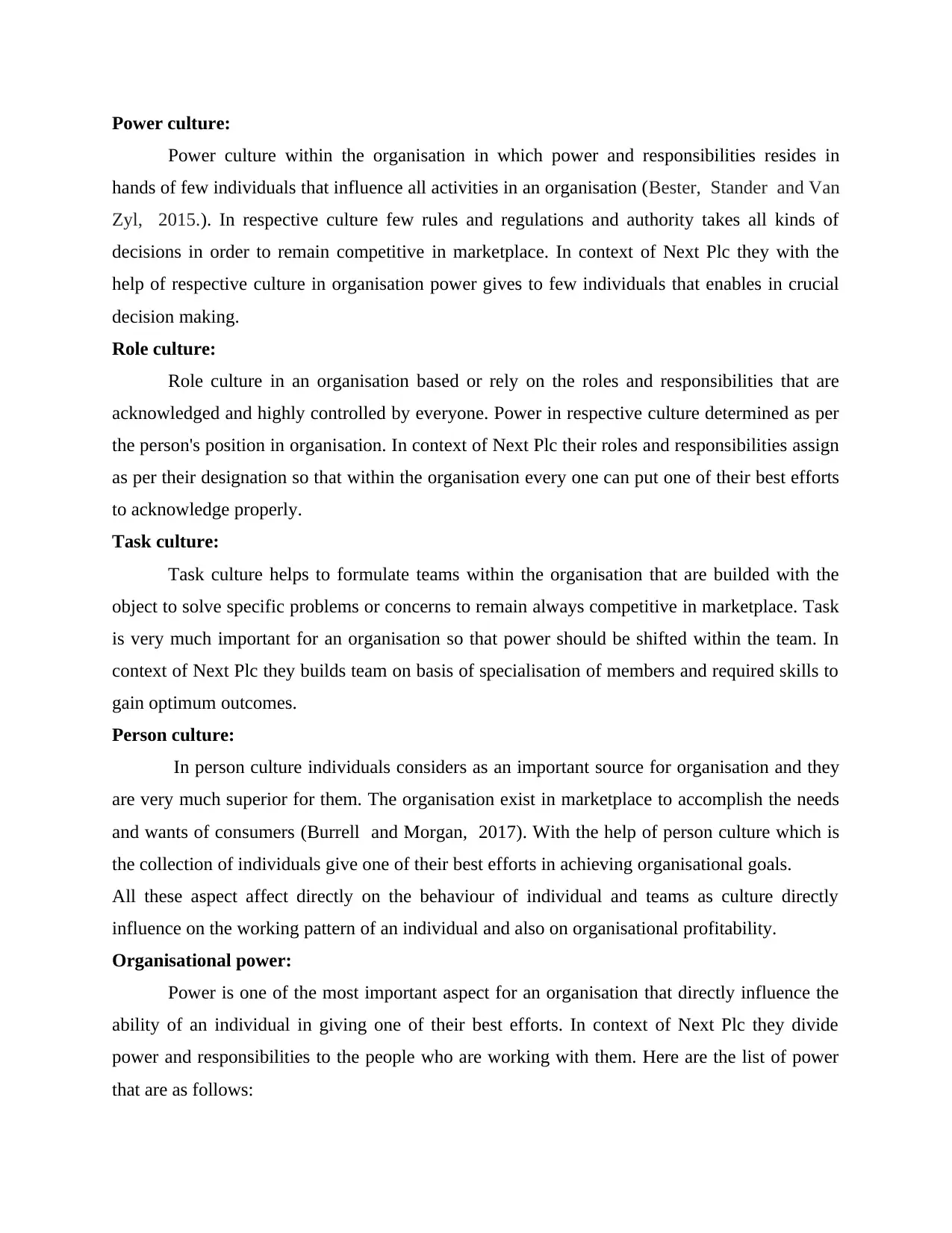
Power culture:
Power culture within the organisation in which power and responsibilities resides in
hands of few individuals that influence all activities in an organisation (Bester, Stander and Van
Zyl, 2015.). In respective culture few rules and regulations and authority takes all kinds of
decisions in order to remain competitive in marketplace. In context of Next Plc they with the
help of respective culture in organisation power gives to few individuals that enables in crucial
decision making.
Role culture:
Role culture in an organisation based or rely on the roles and responsibilities that are
acknowledged and highly controlled by everyone. Power in respective culture determined as per
the person's position in organisation. In context of Next Plc their roles and responsibilities assign
as per their designation so that within the organisation every one can put one of their best efforts
to acknowledge properly.
Task culture:
Task culture helps to formulate teams within the organisation that are builded with the
object to solve specific problems or concerns to remain always competitive in marketplace. Task
is very much important for an organisation so that power should be shifted within the team. In
context of Next Plc they builds team on basis of specialisation of members and required skills to
gain optimum outcomes.
Person culture:
In person culture individuals considers as an important source for organisation and they
are very much superior for them. The organisation exist in marketplace to accomplish the needs
and wants of consumers (Burrell and Morgan, 2017). With the help of person culture which is
the collection of individuals give one of their best efforts in achieving organisational goals.
All these aspect affect directly on the behaviour of individual and teams as culture directly
influence on the working pattern of an individual and also on organisational profitability.
Organisational power:
Power is one of the most important aspect for an organisation that directly influence the
ability of an individual in giving one of their best efforts. In context of Next Plc they divide
power and responsibilities to the people who are working with them. Here are the list of power
that are as follows:
Power culture within the organisation in which power and responsibilities resides in
hands of few individuals that influence all activities in an organisation (Bester, Stander and Van
Zyl, 2015.). In respective culture few rules and regulations and authority takes all kinds of
decisions in order to remain competitive in marketplace. In context of Next Plc they with the
help of respective culture in organisation power gives to few individuals that enables in crucial
decision making.
Role culture:
Role culture in an organisation based or rely on the roles and responsibilities that are
acknowledged and highly controlled by everyone. Power in respective culture determined as per
the person's position in organisation. In context of Next Plc their roles and responsibilities assign
as per their designation so that within the organisation every one can put one of their best efforts
to acknowledge properly.
Task culture:
Task culture helps to formulate teams within the organisation that are builded with the
object to solve specific problems or concerns to remain always competitive in marketplace. Task
is very much important for an organisation so that power should be shifted within the team. In
context of Next Plc they builds team on basis of specialisation of members and required skills to
gain optimum outcomes.
Person culture:
In person culture individuals considers as an important source for organisation and they
are very much superior for them. The organisation exist in marketplace to accomplish the needs
and wants of consumers (Burrell and Morgan, 2017). With the help of person culture which is
the collection of individuals give one of their best efforts in achieving organisational goals.
All these aspect affect directly on the behaviour of individual and teams as culture directly
influence on the working pattern of an individual and also on organisational profitability.
Organisational power:
Power is one of the most important aspect for an organisation that directly influence the
ability of an individual in giving one of their best efforts. In context of Next Plc they divide
power and responsibilities to the people who are working with them. Here are the list of power
that are as follows:
Paraphrase This Document
Need a fresh take? Get an instant paraphrase of this document with our AI Paraphraser
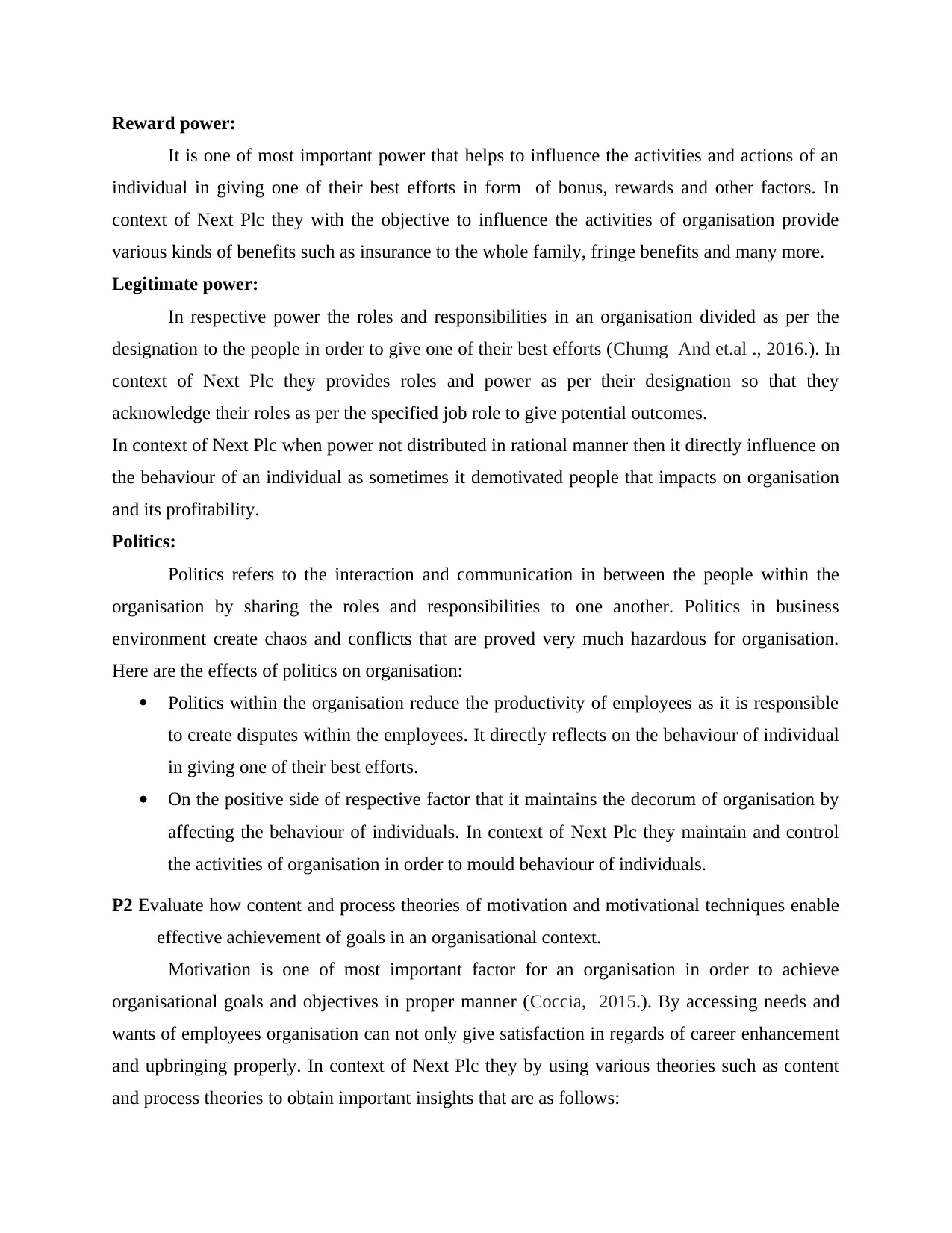
Reward power:
It is one of most important power that helps to influence the activities and actions of an
individual in giving one of their best efforts in form of bonus, rewards and other factors. In
context of Next Plc they with the objective to influence the activities of organisation provide
various kinds of benefits such as insurance to the whole family, fringe benefits and many more.
Legitimate power:
In respective power the roles and responsibilities in an organisation divided as per the
designation to the people in order to give one of their best efforts (Chumg And et.al ., 2016.). In
context of Next Plc they provides roles and power as per their designation so that they
acknowledge their roles as per the specified job role to give potential outcomes.
In context of Next Plc when power not distributed in rational manner then it directly influence on
the behaviour of an individual as sometimes it demotivated people that impacts on organisation
and its profitability.
Politics:
Politics refers to the interaction and communication in between the people within the
organisation by sharing the roles and responsibilities to one another. Politics in business
environment create chaos and conflicts that are proved very much hazardous for organisation.
Here are the effects of politics on organisation:
Politics within the organisation reduce the productivity of employees as it is responsible
to create disputes within the employees. It directly reflects on the behaviour of individual
in giving one of their best efforts.
On the positive side of respective factor that it maintains the decorum of organisation by
affecting the behaviour of individuals. In context of Next Plc they maintain and control
the activities of organisation in order to mould behaviour of individuals.
P2 Evaluate how content and process theories of motivation and motivational techniques enable
effective achievement of goals in an organisational context.
Motivation is one of most important factor for an organisation in order to achieve
organisational goals and objectives in proper manner (Coccia, 2015.). By accessing needs and
wants of employees organisation can not only give satisfaction in regards of career enhancement
and upbringing properly. In context of Next Plc they by using various theories such as content
and process theories to obtain important insights that are as follows:
It is one of most important power that helps to influence the activities and actions of an
individual in giving one of their best efforts in form of bonus, rewards and other factors. In
context of Next Plc they with the objective to influence the activities of organisation provide
various kinds of benefits such as insurance to the whole family, fringe benefits and many more.
Legitimate power:
In respective power the roles and responsibilities in an organisation divided as per the
designation to the people in order to give one of their best efforts (Chumg And et.al ., 2016.). In
context of Next Plc they provides roles and power as per their designation so that they
acknowledge their roles as per the specified job role to give potential outcomes.
In context of Next Plc when power not distributed in rational manner then it directly influence on
the behaviour of an individual as sometimes it demotivated people that impacts on organisation
and its profitability.
Politics:
Politics refers to the interaction and communication in between the people within the
organisation by sharing the roles and responsibilities to one another. Politics in business
environment create chaos and conflicts that are proved very much hazardous for organisation.
Here are the effects of politics on organisation:
Politics within the organisation reduce the productivity of employees as it is responsible
to create disputes within the employees. It directly reflects on the behaviour of individual
in giving one of their best efforts.
On the positive side of respective factor that it maintains the decorum of organisation by
affecting the behaviour of individuals. In context of Next Plc they maintain and control
the activities of organisation in order to mould behaviour of individuals.
P2 Evaluate how content and process theories of motivation and motivational techniques enable
effective achievement of goals in an organisational context.
Motivation is one of most important factor for an organisation in order to achieve
organisational goals and objectives in proper manner (Coccia, 2015.). By accessing needs and
wants of employees organisation can not only give satisfaction in regards of career enhancement
and upbringing properly. In context of Next Plc they by using various theories such as content
and process theories to obtain important insights that are as follows:
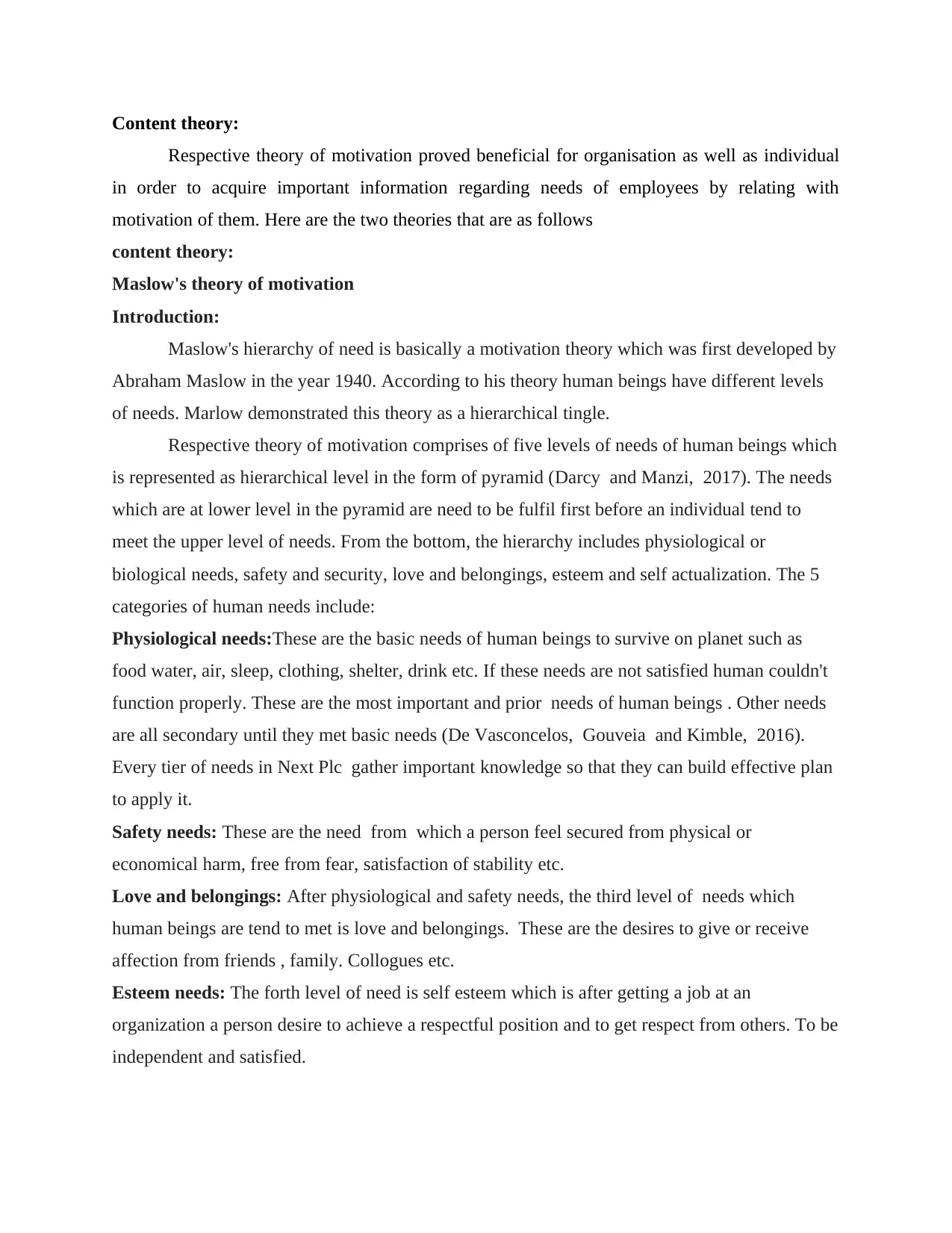
Content theory:
Respective theory of motivation proved beneficial for organisation as well as individual
in order to acquire important information regarding needs of employees by relating with
motivation of them. Here are the two theories that are as follows
content theory:
Maslow's theory of motivation
Introduction:
Maslow's hierarchy of need is basically a motivation theory which was first developed by
Abraham Maslow in the year 1940. According to his theory human beings have different levels
of needs. Marlow demonstrated this theory as a hierarchical tingle.
Respective theory of motivation comprises of five levels of needs of human beings which
is represented as hierarchical level in the form of pyramid (Darcy and Manzi, 2017). The needs
which are at lower level in the pyramid are need to be fulfil first before an individual tend to
meet the upper level of needs. From the bottom, the hierarchy includes physiological or
biological needs, safety and security, love and belongings, esteem and self actualization. The 5
categories of human needs include:
Physiological needs:These are the basic needs of human beings to survive on planet such as
food water, air, sleep, clothing, shelter, drink etc. If these needs are not satisfied human couldn't
function properly. These are the most important and prior needs of human beings . Other needs
are all secondary until they met basic needs (De Vasconcelos, Gouveia and Kimble, 2016).
Every tier of needs in Next Plc gather important knowledge so that they can build effective plan
to apply it.
Safety needs: These are the need from which a person feel secured from physical or
economical harm, free from fear, satisfaction of stability etc.
Love and belongings: After physiological and safety needs, the third level of needs which
human beings are tend to met is love and belongings. These are the desires to give or receive
affection from friends , family. Collogues etc.
Esteem needs: The forth level of need is self esteem which is after getting a job at an
organization a person desire to achieve a respectful position and to get respect from others. To be
independent and satisfied.
Respective theory of motivation proved beneficial for organisation as well as individual
in order to acquire important information regarding needs of employees by relating with
motivation of them. Here are the two theories that are as follows
content theory:
Maslow's theory of motivation
Introduction:
Maslow's hierarchy of need is basically a motivation theory which was first developed by
Abraham Maslow in the year 1940. According to his theory human beings have different levels
of needs. Marlow demonstrated this theory as a hierarchical tingle.
Respective theory of motivation comprises of five levels of needs of human beings which
is represented as hierarchical level in the form of pyramid (Darcy and Manzi, 2017). The needs
which are at lower level in the pyramid are need to be fulfil first before an individual tend to
meet the upper level of needs. From the bottom, the hierarchy includes physiological or
biological needs, safety and security, love and belongings, esteem and self actualization. The 5
categories of human needs include:
Physiological needs:These are the basic needs of human beings to survive on planet such as
food water, air, sleep, clothing, shelter, drink etc. If these needs are not satisfied human couldn't
function properly. These are the most important and prior needs of human beings . Other needs
are all secondary until they met basic needs (De Vasconcelos, Gouveia and Kimble, 2016).
Every tier of needs in Next Plc gather important knowledge so that they can build effective plan
to apply it.
Safety needs: These are the need from which a person feel secured from physical or
economical harm, free from fear, satisfaction of stability etc.
Love and belongings: After physiological and safety needs, the third level of needs which
human beings are tend to met is love and belongings. These are the desires to give or receive
affection from friends , family. Collogues etc.
Esteem needs: The forth level of need is self esteem which is after getting a job at an
organization a person desire to achieve a respectful position and to get respect from others. To be
independent and satisfied.
⊘ This is a preview!⊘
Do you want full access?
Subscribe today to unlock all pages.

Trusted by 1+ million students worldwide
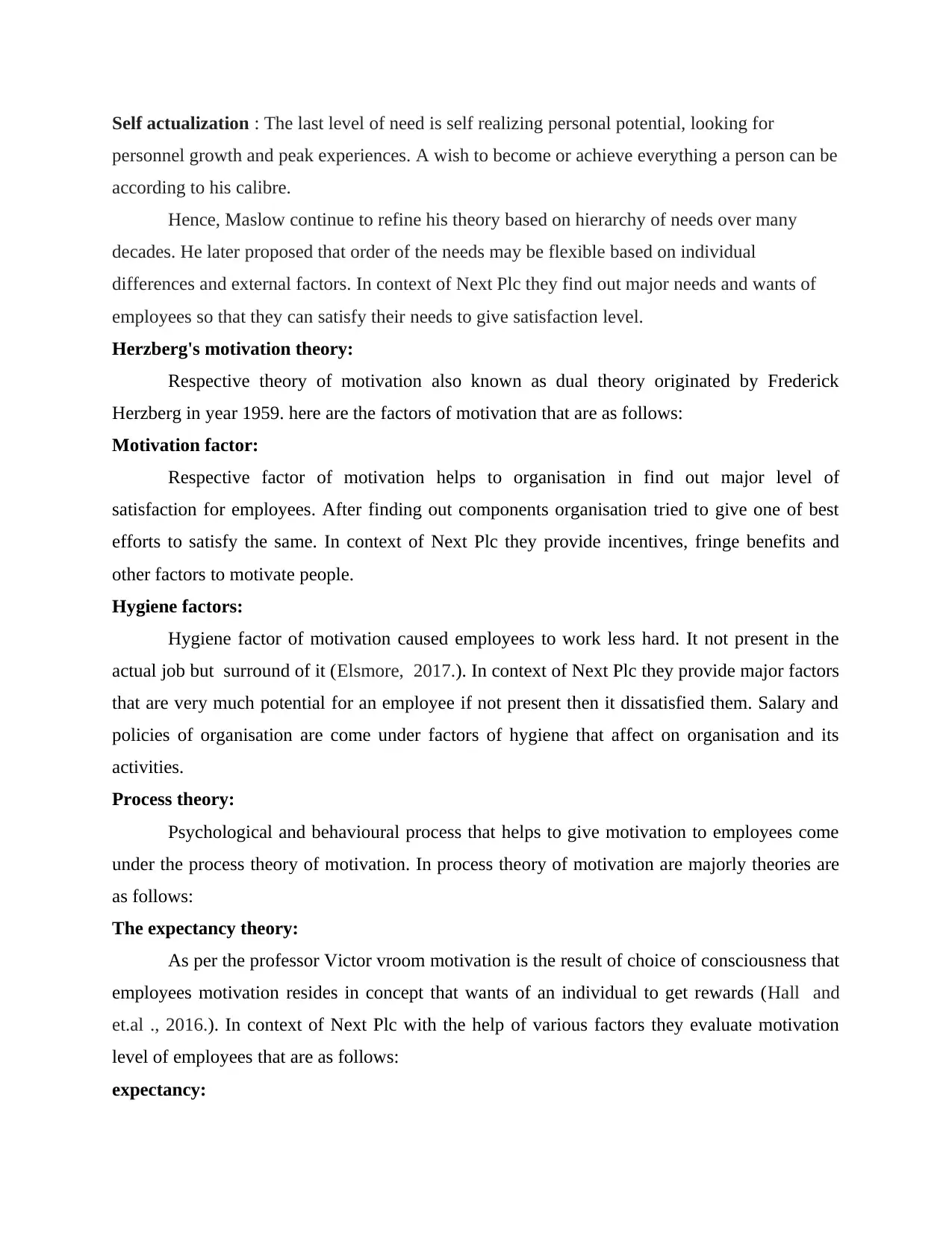
Self actualization : The last level of need is self realizing personal potential, looking for
personnel growth and peak experiences. A wish to become or achieve everything a person can be
according to his calibre.
Hence, Maslow continue to refine his theory based on hierarchy of needs over many
decades. He later proposed that order of the needs may be flexible based on individual
differences and external factors. In context of Next Plc they find out major needs and wants of
employees so that they can satisfy their needs to give satisfaction level.
Herzberg's motivation theory:
Respective theory of motivation also known as dual theory originated by Frederick
Herzberg in year 1959. here are the factors of motivation that are as follows:
Motivation factor:
Respective factor of motivation helps to organisation in find out major level of
satisfaction for employees. After finding out components organisation tried to give one of best
efforts to satisfy the same. In context of Next Plc they provide incentives, fringe benefits and
other factors to motivate people.
Hygiene factors:
Hygiene factor of motivation caused employees to work less hard. It not present in the
actual job but surround of it (Elsmore, 2017.). In context of Next Plc they provide major factors
that are very much potential for an employee if not present then it dissatisfied them. Salary and
policies of organisation are come under factors of hygiene that affect on organisation and its
activities.
Process theory:
Psychological and behavioural process that helps to give motivation to employees come
under the process theory of motivation. In process theory of motivation are majorly theories are
as follows:
The expectancy theory:
As per the professor Victor vroom motivation is the result of choice of consciousness that
employees motivation resides in concept that wants of an individual to get rewards (Hall and
et.al ., 2016.). In context of Next Plc with the help of various factors they evaluate motivation
level of employees that are as follows:
expectancy:
personnel growth and peak experiences. A wish to become or achieve everything a person can be
according to his calibre.
Hence, Maslow continue to refine his theory based on hierarchy of needs over many
decades. He later proposed that order of the needs may be flexible based on individual
differences and external factors. In context of Next Plc they find out major needs and wants of
employees so that they can satisfy their needs to give satisfaction level.
Herzberg's motivation theory:
Respective theory of motivation also known as dual theory originated by Frederick
Herzberg in year 1959. here are the factors of motivation that are as follows:
Motivation factor:
Respective factor of motivation helps to organisation in find out major level of
satisfaction for employees. After finding out components organisation tried to give one of best
efforts to satisfy the same. In context of Next Plc they provide incentives, fringe benefits and
other factors to motivate people.
Hygiene factors:
Hygiene factor of motivation caused employees to work less hard. It not present in the
actual job but surround of it (Elsmore, 2017.). In context of Next Plc they provide major factors
that are very much potential for an employee if not present then it dissatisfied them. Salary and
policies of organisation are come under factors of hygiene that affect on organisation and its
activities.
Process theory:
Psychological and behavioural process that helps to give motivation to employees come
under the process theory of motivation. In process theory of motivation are majorly theories are
as follows:
The expectancy theory:
As per the professor Victor vroom motivation is the result of choice of consciousness that
employees motivation resides in concept that wants of an individual to get rewards (Hall and
et.al ., 2016.). In context of Next Plc with the help of various factors they evaluate motivation
level of employees that are as follows:
expectancy:
Paraphrase This Document
Need a fresh take? Get an instant paraphrase of this document with our AI Paraphraser
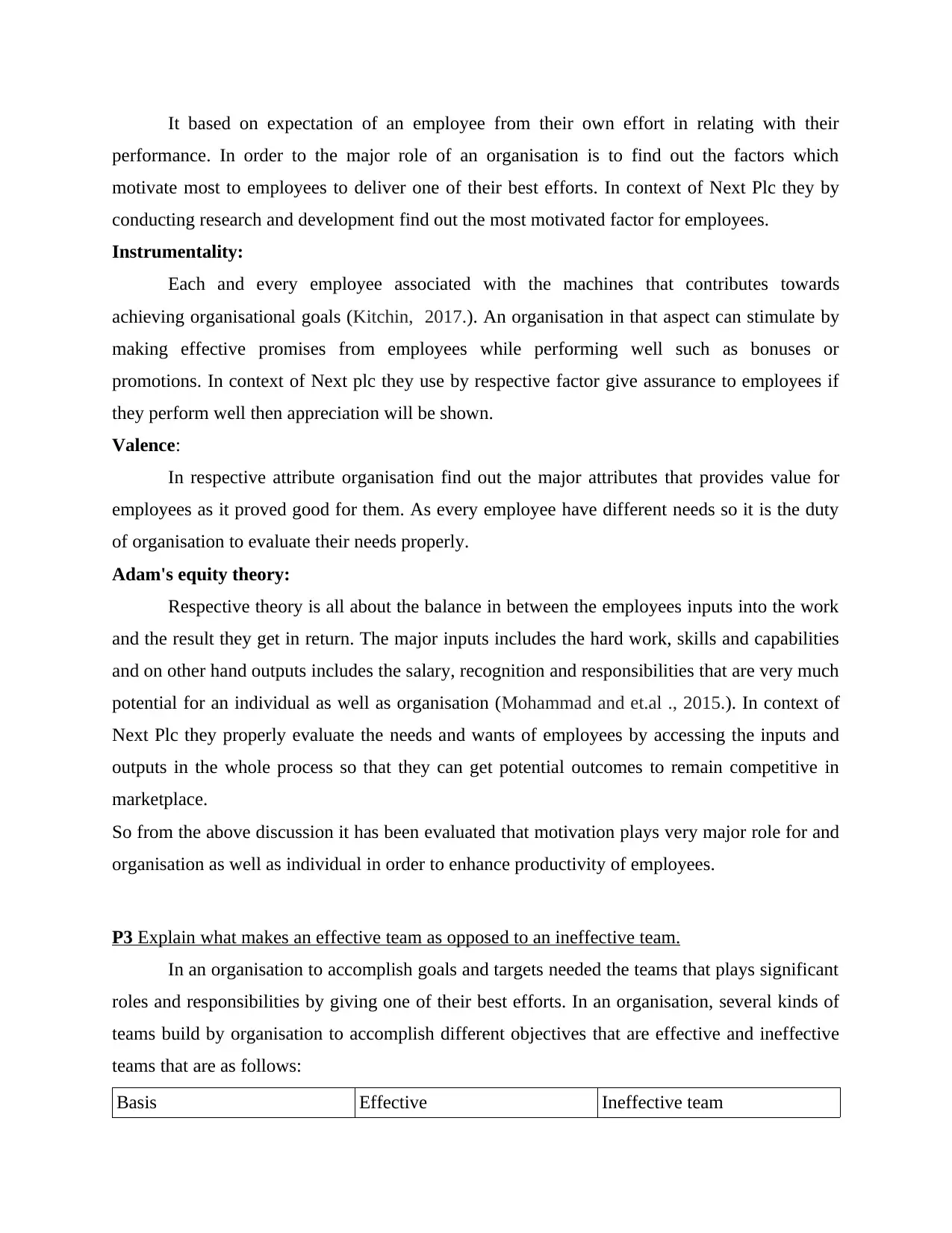
It based on expectation of an employee from their own effort in relating with their
performance. In order to the major role of an organisation is to find out the factors which
motivate most to employees to deliver one of their best efforts. In context of Next Plc they by
conducting research and development find out the most motivated factor for employees.
Instrumentality:
Each and every employee associated with the machines that contributes towards
achieving organisational goals (Kitchin, 2017.). An organisation in that aspect can stimulate by
making effective promises from employees while performing well such as bonuses or
promotions. In context of Next plc they use by respective factor give assurance to employees if
they perform well then appreciation will be shown.
Valence:
In respective attribute organisation find out the major attributes that provides value for
employees as it proved good for them. As every employee have different needs so it is the duty
of organisation to evaluate their needs properly.
Adam's equity theory:
Respective theory is all about the balance in between the employees inputs into the work
and the result they get in return. The major inputs includes the hard work, skills and capabilities
and on other hand outputs includes the salary, recognition and responsibilities that are very much
potential for an individual as well as organisation (Mohammad and et.al ., 2015.). In context of
Next Plc they properly evaluate the needs and wants of employees by accessing the inputs and
outputs in the whole process so that they can get potential outcomes to remain competitive in
marketplace.
So from the above discussion it has been evaluated that motivation plays very major role for and
organisation as well as individual in order to enhance productivity of employees.
P3 Explain what makes an effective team as opposed to an ineffective team.
In an organisation to accomplish goals and targets needed the teams that plays significant
roles and responsibilities by giving one of their best efforts. In an organisation, several kinds of
teams build by organisation to accomplish different objectives that are effective and ineffective
teams that are as follows:
Basis Effective Ineffective team
performance. In order to the major role of an organisation is to find out the factors which
motivate most to employees to deliver one of their best efforts. In context of Next Plc they by
conducting research and development find out the most motivated factor for employees.
Instrumentality:
Each and every employee associated with the machines that contributes towards
achieving organisational goals (Kitchin, 2017.). An organisation in that aspect can stimulate by
making effective promises from employees while performing well such as bonuses or
promotions. In context of Next plc they use by respective factor give assurance to employees if
they perform well then appreciation will be shown.
Valence:
In respective attribute organisation find out the major attributes that provides value for
employees as it proved good for them. As every employee have different needs so it is the duty
of organisation to evaluate their needs properly.
Adam's equity theory:
Respective theory is all about the balance in between the employees inputs into the work
and the result they get in return. The major inputs includes the hard work, skills and capabilities
and on other hand outputs includes the salary, recognition and responsibilities that are very much
potential for an individual as well as organisation (Mohammad and et.al ., 2015.). In context of
Next Plc they properly evaluate the needs and wants of employees by accessing the inputs and
outputs in the whole process so that they can get potential outcomes to remain competitive in
marketplace.
So from the above discussion it has been evaluated that motivation plays very major role for and
organisation as well as individual in order to enhance productivity of employees.
P3 Explain what makes an effective team as opposed to an ineffective team.
In an organisation to accomplish goals and targets needed the teams that plays significant
roles and responsibilities by giving one of their best efforts. In an organisation, several kinds of
teams build by organisation to accomplish different objectives that are effective and ineffective
teams that are as follows:
Basis Effective Ineffective team
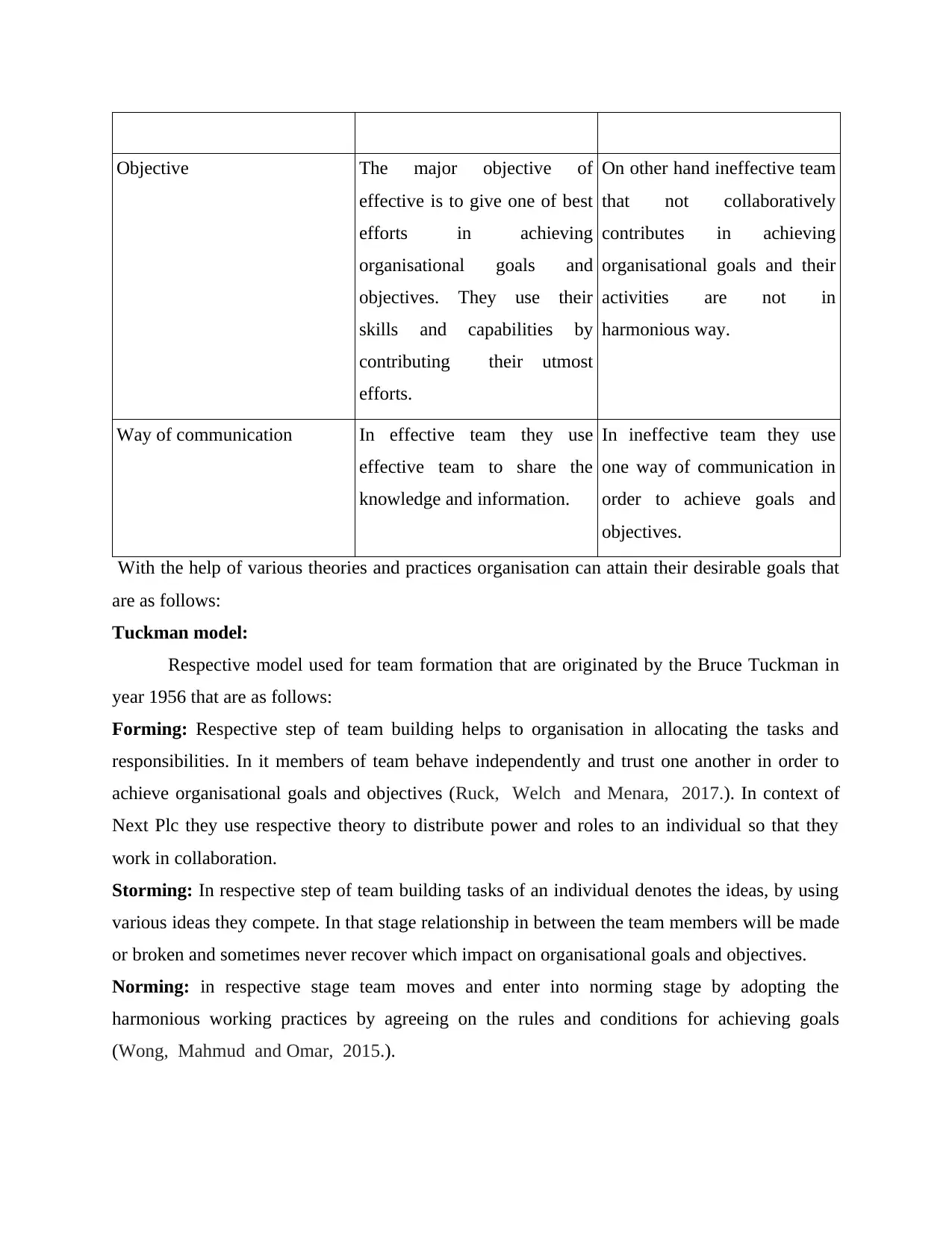
Objective The major objective of
effective is to give one of best
efforts in achieving
organisational goals and
objectives. They use their
skills and capabilities by
contributing their utmost
efforts.
On other hand ineffective team
that not collaboratively
contributes in achieving
organisational goals and their
activities are not in
harmonious way.
Way of communication In effective team they use
effective team to share the
knowledge and information.
In ineffective team they use
one way of communication in
order to achieve goals and
objectives.
With the help of various theories and practices organisation can attain their desirable goals that
are as follows:
Tuckman model:
Respective model used for team formation that are originated by the Bruce Tuckman in
year 1956 that are as follows:
Forming: Respective step of team building helps to organisation in allocating the tasks and
responsibilities. In it members of team behave independently and trust one another in order to
achieve organisational goals and objectives (Ruck, Welch and Menara, 2017.). In context of
Next Plc they use respective theory to distribute power and roles to an individual so that they
work in collaboration.
Storming: In respective step of team building tasks of an individual denotes the ideas, by using
various ideas they compete. In that stage relationship in between the team members will be made
or broken and sometimes never recover which impact on organisational goals and objectives.
Norming: in respective stage team moves and enter into norming stage by adopting the
harmonious working practices by agreeing on the rules and conditions for achieving goals
(Wong, Mahmud and Omar, 2015.).
effective is to give one of best
efforts in achieving
organisational goals and
objectives. They use their
skills and capabilities by
contributing their utmost
efforts.
On other hand ineffective team
that not collaboratively
contributes in achieving
organisational goals and their
activities are not in
harmonious way.
Way of communication In effective team they use
effective team to share the
knowledge and information.
In ineffective team they use
one way of communication in
order to achieve goals and
objectives.
With the help of various theories and practices organisation can attain their desirable goals that
are as follows:
Tuckman model:
Respective model used for team formation that are originated by the Bruce Tuckman in
year 1956 that are as follows:
Forming: Respective step of team building helps to organisation in allocating the tasks and
responsibilities. In it members of team behave independently and trust one another in order to
achieve organisational goals and objectives (Ruck, Welch and Menara, 2017.). In context of
Next Plc they use respective theory to distribute power and roles to an individual so that they
work in collaboration.
Storming: In respective step of team building tasks of an individual denotes the ideas, by using
various ideas they compete. In that stage relationship in between the team members will be made
or broken and sometimes never recover which impact on organisational goals and objectives.
Norming: in respective stage team moves and enter into norming stage by adopting the
harmonious working practices by agreeing on the rules and conditions for achieving goals
(Wong, Mahmud and Omar, 2015.).
⊘ This is a preview!⊘
Do you want full access?
Subscribe today to unlock all pages.

Trusted by 1+ million students worldwide
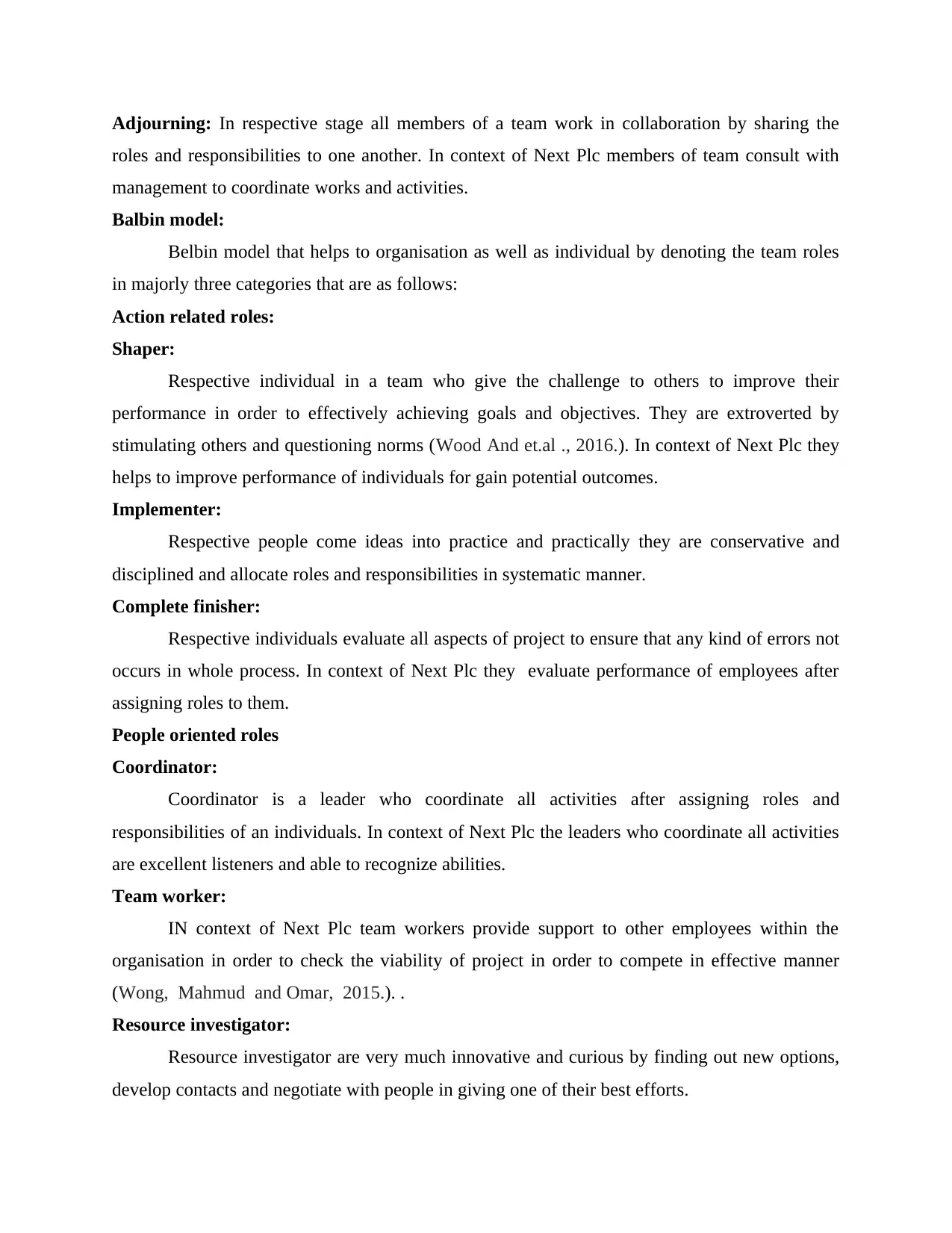
Adjourning: In respective stage all members of a team work in collaboration by sharing the
roles and responsibilities to one another. In context of Next Plc members of team consult with
management to coordinate works and activities.
Balbin model:
Belbin model that helps to organisation as well as individual by denoting the team roles
in majorly three categories that are as follows:
Action related roles:
Shaper:
Respective individual in a team who give the challenge to others to improve their
performance in order to effectively achieving goals and objectives. They are extroverted by
stimulating others and questioning norms (Wood And et.al ., 2016.). In context of Next Plc they
helps to improve performance of individuals for gain potential outcomes.
Implementer:
Respective people come ideas into practice and practically they are conservative and
disciplined and allocate roles and responsibilities in systematic manner.
Complete finisher:
Respective individuals evaluate all aspects of project to ensure that any kind of errors not
occurs in whole process. In context of Next Plc they evaluate performance of employees after
assigning roles to them.
People oriented roles
Coordinator:
Coordinator is a leader who coordinate all activities after assigning roles and
responsibilities of an individuals. In context of Next Plc the leaders who coordinate all activities
are excellent listeners and able to recognize abilities.
Team worker:
IN context of Next Plc team workers provide support to other employees within the
organisation in order to check the viability of project in order to compete in effective manner
(Wong, Mahmud and Omar, 2015.). .
Resource investigator:
Resource investigator are very much innovative and curious by finding out new options,
develop contacts and negotiate with people in giving one of their best efforts.
roles and responsibilities to one another. In context of Next Plc members of team consult with
management to coordinate works and activities.
Balbin model:
Belbin model that helps to organisation as well as individual by denoting the team roles
in majorly three categories that are as follows:
Action related roles:
Shaper:
Respective individual in a team who give the challenge to others to improve their
performance in order to effectively achieving goals and objectives. They are extroverted by
stimulating others and questioning norms (Wood And et.al ., 2016.). In context of Next Plc they
helps to improve performance of individuals for gain potential outcomes.
Implementer:
Respective people come ideas into practice and practically they are conservative and
disciplined and allocate roles and responsibilities in systematic manner.
Complete finisher:
Respective individuals evaluate all aspects of project to ensure that any kind of errors not
occurs in whole process. In context of Next Plc they evaluate performance of employees after
assigning roles to them.
People oriented roles
Coordinator:
Coordinator is a leader who coordinate all activities after assigning roles and
responsibilities of an individuals. In context of Next Plc the leaders who coordinate all activities
are excellent listeners and able to recognize abilities.
Team worker:
IN context of Next Plc team workers provide support to other employees within the
organisation in order to check the viability of project in order to compete in effective manner
(Wong, Mahmud and Omar, 2015.). .
Resource investigator:
Resource investigator are very much innovative and curious by finding out new options,
develop contacts and negotiate with people in giving one of their best efforts.
Paraphrase This Document
Need a fresh take? Get an instant paraphrase of this document with our AI Paraphraser
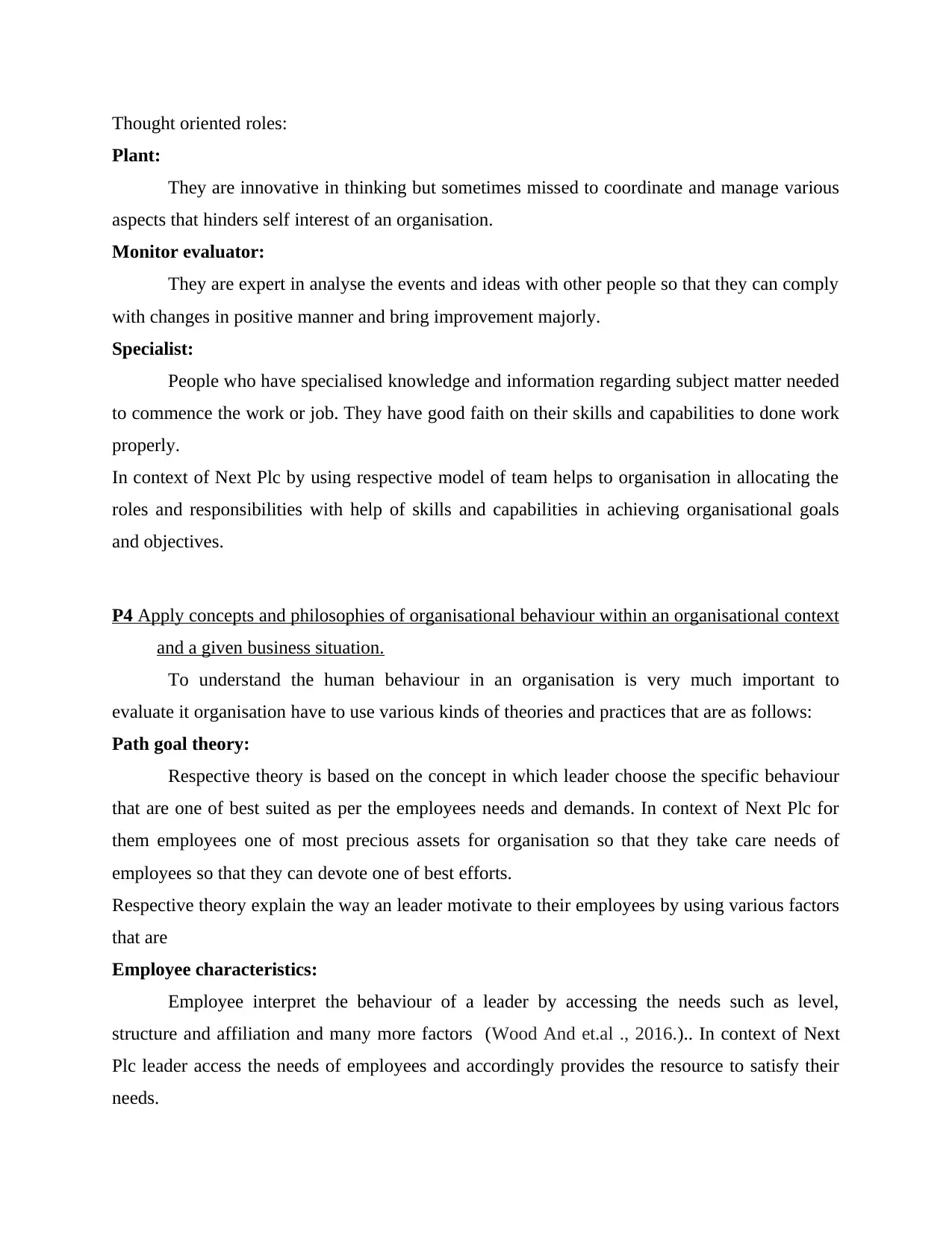
Thought oriented roles:
Plant:
They are innovative in thinking but sometimes missed to coordinate and manage various
aspects that hinders self interest of an organisation.
Monitor evaluator:
They are expert in analyse the events and ideas with other people so that they can comply
with changes in positive manner and bring improvement majorly.
Specialist:
People who have specialised knowledge and information regarding subject matter needed
to commence the work or job. They have good faith on their skills and capabilities to done work
properly.
In context of Next Plc by using respective model of team helps to organisation in allocating the
roles and responsibilities with help of skills and capabilities in achieving organisational goals
and objectives.
P4 Apply concepts and philosophies of organisational behaviour within an organisational context
and a given business situation.
To understand the human behaviour in an organisation is very much important to
evaluate it organisation have to use various kinds of theories and practices that are as follows:
Path goal theory:
Respective theory is based on the concept in which leader choose the specific behaviour
that are one of best suited as per the employees needs and demands. In context of Next Plc for
them employees one of most precious assets for organisation so that they take care needs of
employees so that they can devote one of best efforts.
Respective theory explain the way an leader motivate to their employees by using various factors
that are
Employee characteristics:
Employee interpret the behaviour of a leader by accessing the needs such as level,
structure and affiliation and many more factors (Wood And et.al ., 2016.).. In context of Next
Plc leader access the needs of employees and accordingly provides the resource to satisfy their
needs.
Plant:
They are innovative in thinking but sometimes missed to coordinate and manage various
aspects that hinders self interest of an organisation.
Monitor evaluator:
They are expert in analyse the events and ideas with other people so that they can comply
with changes in positive manner and bring improvement majorly.
Specialist:
People who have specialised knowledge and information regarding subject matter needed
to commence the work or job. They have good faith on their skills and capabilities to done work
properly.
In context of Next Plc by using respective model of team helps to organisation in allocating the
roles and responsibilities with help of skills and capabilities in achieving organisational goals
and objectives.
P4 Apply concepts and philosophies of organisational behaviour within an organisational context
and a given business situation.
To understand the human behaviour in an organisation is very much important to
evaluate it organisation have to use various kinds of theories and practices that are as follows:
Path goal theory:
Respective theory is based on the concept in which leader choose the specific behaviour
that are one of best suited as per the employees needs and demands. In context of Next Plc for
them employees one of most precious assets for organisation so that they take care needs of
employees so that they can devote one of best efforts.
Respective theory explain the way an leader motivate to their employees by using various factors
that are
Employee characteristics:
Employee interpret the behaviour of a leader by accessing the needs such as level,
structure and affiliation and many more factors (Wood And et.al ., 2016.).. In context of Next
Plc leader access the needs of employees and accordingly provides the resource to satisfy their
needs.
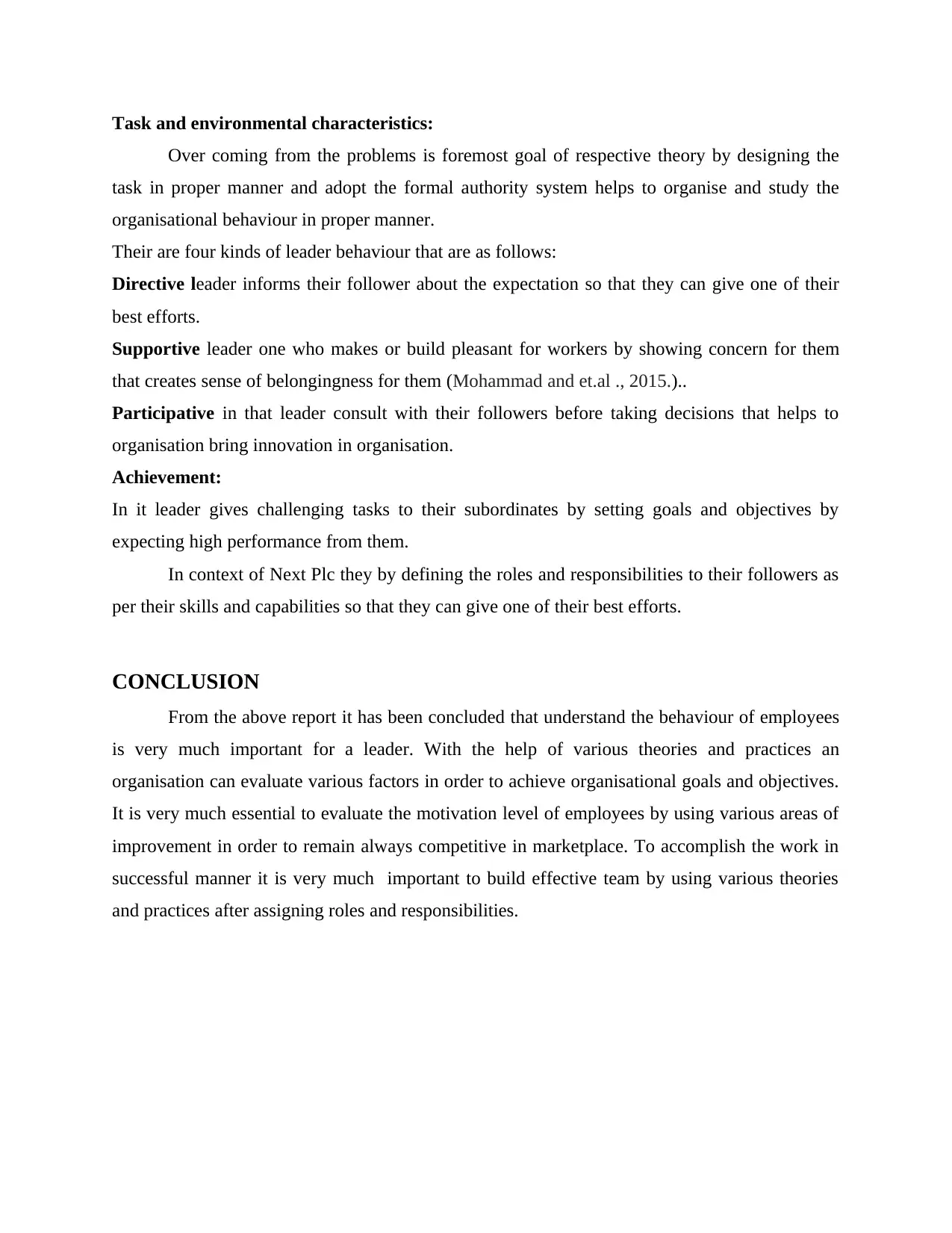
Task and environmental characteristics:
Over coming from the problems is foremost goal of respective theory by designing the
task in proper manner and adopt the formal authority system helps to organise and study the
organisational behaviour in proper manner.
Their are four kinds of leader behaviour that are as follows:
Directive leader informs their follower about the expectation so that they can give one of their
best efforts.
Supportive leader one who makes or build pleasant for workers by showing concern for them
that creates sense of belongingness for them (Mohammad and et.al ., 2015.)..
Participative in that leader consult with their followers before taking decisions that helps to
organisation bring innovation in organisation.
Achievement:
In it leader gives challenging tasks to their subordinates by setting goals and objectives by
expecting high performance from them.
In context of Next Plc they by defining the roles and responsibilities to their followers as
per their skills and capabilities so that they can give one of their best efforts.
CONCLUSION
From the above report it has been concluded that understand the behaviour of employees
is very much important for a leader. With the help of various theories and practices an
organisation can evaluate various factors in order to achieve organisational goals and objectives.
It is very much essential to evaluate the motivation level of employees by using various areas of
improvement in order to remain always competitive in marketplace. To accomplish the work in
successful manner it is very much important to build effective team by using various theories
and practices after assigning roles and responsibilities.
Over coming from the problems is foremost goal of respective theory by designing the
task in proper manner and adopt the formal authority system helps to organise and study the
organisational behaviour in proper manner.
Their are four kinds of leader behaviour that are as follows:
Directive leader informs their follower about the expectation so that they can give one of their
best efforts.
Supportive leader one who makes or build pleasant for workers by showing concern for them
that creates sense of belongingness for them (Mohammad and et.al ., 2015.)..
Participative in that leader consult with their followers before taking decisions that helps to
organisation bring innovation in organisation.
Achievement:
In it leader gives challenging tasks to their subordinates by setting goals and objectives by
expecting high performance from them.
In context of Next Plc they by defining the roles and responsibilities to their followers as
per their skills and capabilities so that they can give one of their best efforts.
CONCLUSION
From the above report it has been concluded that understand the behaviour of employees
is very much important for a leader. With the help of various theories and practices an
organisation can evaluate various factors in order to achieve organisational goals and objectives.
It is very much essential to evaluate the motivation level of employees by using various areas of
improvement in order to remain always competitive in marketplace. To accomplish the work in
successful manner it is very much important to build effective team by using various theories
and practices after assigning roles and responsibilities.
⊘ This is a preview!⊘
Do you want full access?
Subscribe today to unlock all pages.

Trusted by 1+ million students worldwide
1 out of 13
Related Documents
Your All-in-One AI-Powered Toolkit for Academic Success.
+13062052269
info@desklib.com
Available 24*7 on WhatsApp / Email
![[object Object]](/_next/static/media/star-bottom.7253800d.svg)
Unlock your academic potential
Copyright © 2020–2026 A2Z Services. All Rights Reserved. Developed and managed by ZUCOL.





